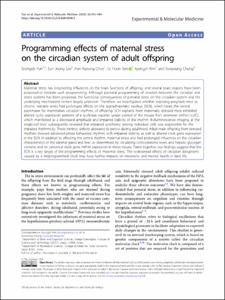Programming effects of maternal stress on the circadian system of adult offspring
- Title
- Programming effects of maternal stress on the circadian system of adult offspring
- Author(s)
- Yun, Seongsik ; Lee, Eun Jeong ; Choe, Han Kyoung ; Son, Gi Hoon ; Kim, Kyungjin ; Chung, Sooyoung
- Issued Date
- 2020-03
- Citation
- Experimental and Molecular Medicine, v.52, no.3, pp.473 - 484
- Type
- Article
- Keywords
- MOUSE SUPRACHIASMATIC NUCLEUS ; REV-ERB-ALPHA ; GENE-EXPRESSION ; RHYTHMS ; GLUCOCORTICOIDS ; TRANSCRIPTION ; OSCILLATION ; ACTIVATION ; ALTERS ; IMPAIRMENT
- ISSN
- 1226-3613
- Abstract
- Maternal stress has long-lasting influences on the brain functions of offspring, and several brain regions have been proposed to mediate such programming. Although perinatal programming of crosstalk between the circadian and stress systems has been proposed, the functional consequences of prenatal stress on the circadian system and the underlying mechanisms remain largely unknown. Therefore, we investigated whether exposing pregnant mice to chronic restraint stress had prolonged effects on the suprachiasmatic nucleus (SCN), which bears the central pacemaker for mammalian circadian rhythms, of offspring. SCN explants from maternally stressed mice exhibited altered cyclic expression patterns of a luciferase reporter under control of the mouse Per1 promoter (mPer1::LUC), which manifested as a decreased amplitude and impaired stability of the rhythm. Bioluminescence imaging at the single-cell level subsequently revealed that impaired synchrony among individual cells was responsible for the impaired rhythmicity. These intrinsic defects appeared to persist during adulthood. Adult male offspring from stressed mothers showed advanced-phase behavioral rhythms with impaired stability as well as altered clock gene expression in the SCN. In addition to affecting the central rhythm, maternal stress also had prolonged influences on the circadian characteristics of the adrenal gland and liver, as determined by circulating corticosterone levels and hepatic glycogen content, and on canonical clock gene mRNA expression in those tissues. Taken together, our findings suggest that the SCN is a key target of the programming effects of maternal stress. The widespread effects of circadian disruptions caused by a misprogrammed clock may have further impacts on metabolic and mental health in later life. © 2020, The Author(s).
- Publisher
- Nature Publishing Group
- Related Researcher
-
-
Choe, Han Kyoung
- Research Interests Modulation of neural circuit; Circadian regulation of behavior and perception; Neurotechnology
-
- Files in This Item:
-
 기타 데이터 / 1.56 MB / Adobe PDF
download
기타 데이터 / 1.56 MB / Adobe PDF
download
- Appears in Collections:
- Department of Brain Sciences Laboratory of Animal Behavior and Circadian rhythm 1. Journal Articles



